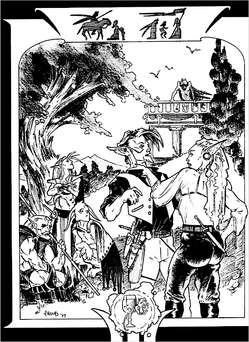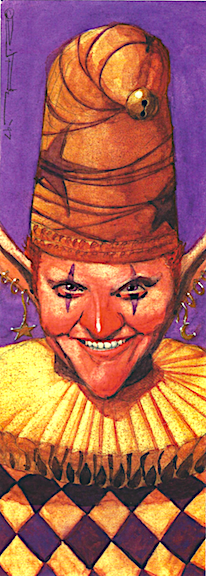A Household is a group of Changelings tied to a freehold who serve the local ruler as vassals or as retainers.
Overview[]

Unlike motleys who resist the feudal ways of the Sidhe, a Household is embedded into the system as it has been reimposed by the Resurgent nobles. They ally themselves with the noble hierarchy and are, in fact, the backbone of the Kingdom of Concordia and its vassal Kingdoms. Every household displays the escutcheon of its ruling Lord or Lady as well as its own unique battle standard. The lord of a household must be at least a Knight in rank but more often is a Baron or of greater rank.
Kithain take great pride in their their households and work to ensure their success and improve their reputations. The glory of one member brings glory to all and competitions between households is common. Having at least one major rival household is common and one takes every opportunity to best them on the tourney field or in the realm of courtly loves.
Although most households are ruled by the Sidhe, there are a few under the care of ennobled commoners which are as loyal, if not more so, to the social structure that gives them power.
If the household is in disorder, the kingdom is in disorder. This is true of the smallest fiefdom and the greatest kingdom. The household describes the immediate freehold of the noble. It includes their family, retainers and other hangers-on. The household may be the greatest source of strength to the noble, or it may destroy them utterly. Kithain history holds many examples of high lords brought low by a faithless spouse, or scheming children.
Retainers[]

While Vassals are lesser nobility that owe fealty to the lord or lady of a household, retainers are not tied to the noble hierarchy and are the major portion of the community, tending to its day to day functioning. These fae, many of them commoners, have given their loyalty and service to the ruler in exchange for comfort, position, and pay of some sort, whether promises or treasures. Such fae are seen as sellouts by members of motleys who look down on them for giving up their personal freedom for doubtful gain.
Heralds[]
Heralds serve as messengers, diplomats, and couriers to their lord or lady. This gives them some diplomatic immunity when interacting with other noble courts, as long as they obey protocol and show proper respect to superiors. They often serve as spies since their duties allow them to move within various circles without arousing suspicion. They often posses treasures from their lord that let them travel quickly from place to place. They also are responsible for summoning up commoner troops when fiefdoms are in danger.
Seers[]
Seers are skilled sorcerers who act as advisors to their lady or lord. They are charged with keeping watch against magical attacks against the ruler and his or her fiefdom, conducting rituals such as Sainings, and advising the ruler on lore and chimera. Their command of magic can make them distrusted but most are scrupulously honest in their ways.
Chancellors / Seneschals[]
Their Lord or Lady's right hand, Chancellors (also Seneschals) govern the domain when the ruler is absent and protect the fiefdoms from attack. Their detailed knowledge of the workings of the freeholds and lands under their care usually earns them the trust and respect of the noble over them. Few abuse this confidence and most are given almost as much honor as their master or mistress.
Bards[]
Serving as a court's storytellers and lore keepers, a Bard's person is considered sacred and bad luck follows anyone who knowingly strikes him or her or engages them in battle if they are unwilling. Their words are considered prophetic and so many refrain from speaking unless performing or specifically asked to contribute to a conversation because of the chance that their words will carry the force of prophesy just by coming from their lips. They are among the most respected retainers.
Jesters[]

The Jester entertains the nobility and brings in Glamour on certain festive occasions. They also act as the watch for Banality. They point out the foibles and faults of the nobles in ways that amuse rather than humiliate and so provided a means for the wayward sidhe or ennobled commoner to modify their behavior. The clown has the duty to sniff out the mundane and destroy it before it destroys the fiefdom and gets access to cantrips and treasures to do their important job.
Troubadours[]
The musicians and performers of a noble's court, the Troubadours also lead the court in the arts of courtly love, filling the roles of chronicler and go-between. Sometimes they themselves are involved in the amorous machinations of the nobility. The perform original works, traditional ballads, and compose specially commissioned songs in honor of patrons or paramours.
Scribes[]
The Scribes not only record the proceedings of the court, they also transcribe any memories that members of the court may have of Arcadia or their past lives. This is done in traditional style: On vellum with quill and ink in chimerical tomes bound in griffin or boar hide. Many scribes illuminate their books with fanciful pictures to create works of beauty and repositories for Glamour.
Stewards[]
Stewards are responsible for the fiefdom's resources and organize and govern their ruler's assets. They control household finances, disburse chimerical and mundane weapons, and guard court treasures. They also train and manage household servants.
Reeves[]
Reeves serve as official liaisons between a noble and the commoners who dwell in his or her domains. They fill the position of advocate for the commoners and will often appear in court to represent a commoner's claim or complaint. They also take care of a noble's freeholds and most courts have at least as many reeves as there are freeholds. Though they are only caretakers, some reeves may come to see their particular freehold as their own.
Thanes[]
Commoner warriors who have sworn loyalty to a Lord or Lady, Thanes are charged with hunting Glamour for their masters. Many Sidhe like putting commoner soldier in battle because they can be more effective than noble knights. Others see them as more expendable. Other, more paranoid nobles, don't trust them at all. Many thanes who were once leaders in the Accordance War now serve the noble they fought against. Accepting these warriors helped the Sidhe smooth over relations with the commoners and continuing to respect and honor their thanes helps the nobles continue to find support from their subjects.
References[]
- CTD. Changeling: The Dreaming Second Edition, pp. 70, 77-78.
- CTD. Nobles: The Shining Host, p. 44.
